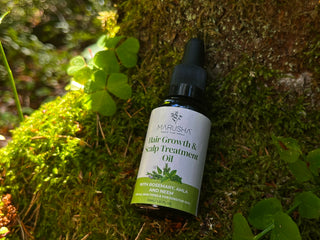Everyone of us has experienced hair loss. To help you with it we recommend a 5-step guide to controlling hair loss.
Simple and effective tips practiced at home can help you to prevent hair loss and achieve longer, stronger and healthier hair.
Step 1: Oiling the hair
Massaging the scalp with hair oil, which contains coconut oil, castor oil, olive oil, helps improve blood circulation, nourishes hair follicles and prevents hair loss. It is recommended to oil your hair at least once a week and leave the oil on for at least 30 minutes before shampooing.
Tips on how to do it:
- Choose an hair oil that suits your hair type and scalp needs (for example, coconut oil helps dry hair, castor oil is for thinning hair). We recommend MARUSHA Rosemary and Neem hair growth and scalp treatment oil, which is a light oil and is a combination of the best oils for hair, which strengthens the hair roots and nourishes the scalp.
- Before applying it, if you wish, you can keep the oil in warm water and warm it up. Forgot about hot-oil treatments, because it heats up the hair, which further damages fragile hair.
- Part your hair and apply the oil to your scalp, massaging it in circular motions for 5-10 minutes. Use a wide-toothed comb to distribute the oil evenly through the length of your hair.
- Cover your hair with a shower cap or wrap it in a towel to keep it warm and allow the oil to penetrate. Leave the oil on for a minimum of 30 minutes before shampooing.
If you are looking for the best hair oils, we recommend MARUSHA Hair Oil with clinically proven effectiveness. Customer reviews show that MARUSHA Hair Oil reduces hair loss after just 30 days. MARUSHA Hair oil will nourish the hair and scalp and will strengthen the hair roots. MARUSHA Hair oil is light oil and it washes off easily.
Step 2: Hair cleansing
After oiling, use a mild, natural, sulfate-free shampoo, which does not contain chemicals and SLSA, which can damage hair follicles. Avoid using hot water, as it can strip the hair of its natural oils and make it more prone to breakage. Instead, use lukewarm water to rinse your hair and scalp.
Tips on how to do it:
- Use a gentle shampoo. Some shampoos can strip moisture from hair.
- Wet your hair and scalp with lukewarm water.
- Apply a small amount of sulfate-free shampoo to your scalp and gently massage it in.
- Rinse thoroughly with lukewarm water.
- Repeat if necessary.
If you are looking for the best hair fall control shampoo, we recommend MARUSHA strengthening and growth-promoting Juniper Solid shampoos with Rosemary, Neem, and Olive oil, which moisturize and nourish the hair and scalp, making the hair healthy, thick and shiny.
Step 3: Hair conditioning
Conditioning is an essential step in the hair care routine as it helps to restore the hair's moisture levels, leaving it soft, smooth and shiny. Well-conditioned hair is less likely to break, which reduces the risk of hair loss. Conditioner coats your strands, which reduces breakage, split ends and frizz.
Tips on how to do it:
- After shampooing, apply a moisturizing and nourishing conditioner to the length of your hair.
- Leave it on for 5-10 minutes, or as per the instructions on the product.
- Rinse thoroughly with lukewarm water.
- Wrap your hair in a microfiber towel to help it dry more quickly. This helps reduce the time you spend blow-drying.
We recommend MARUSHA Solid Juniper Hair Conditioner, which is made of plant-based raw materials and contains natural silk, olive oil, neem, rosemary, panthenol and vitamin E. It will provide hair with additional nutrition, hydration and reduce hair loss, as well as make hair and hair roots stronger with every wash.
Step 4: Hair detangling
Detangling is an important step in reducing hair fall. When the hair is wet, it is more fragile and prone to breakage, so it's important to use a wide-toothed comb to gently remove any knots and tangles. Starting from the ends and working your way up to the roots can help to minimize breakage and keep the hair healthy.
Tips on how to do it:
- While your hair is still wet, use a wide-toothed comb to gently remove any knots and tangles. Before detangling we recommend to use natural Hair Spray or Tonic for hair and hair ends - Marusha Rosemary & Aloe Hair Spray Tonic. Brush or comb your hair gently, and only enough to style it. Tugging on your hair while brushing or combing it can lead to hair loss.
- Start from the ends and work your way up to the roots.
- Take care not to pull or tug at the hair, as this can cause breakage and increase the risk of hair fall.
Step 5: Styling
Styling can cause damage to the hair if not done properly, which can lead to hair fall. Using a heat protectant spray - Marusha Rosemary Hair Spray Tonic - before using heat styling tools such as hair dryers or straighteners can help to reduce heat damage and keep the hair healthy. Limiting the use of these tools, and opting for air-drying whenever possible, can also help to reduce the risk of hair fall.
Tips on how to do it:
- If using heat styling tools such as hair dryers or straighteners, spray a heat protectant MARUSHA Rosemary spray on your hair to reduce heat damage.
- Use a low heat setting and avoid overusing these tools.
- If possible, air-dry your hair, as this can help to reduce the risk of heat damage and hair fall.
- Stop wearing your hair tightly pulled back in a bun, ponytail, pigtails, cornrows, or braids.Frequently wearing a hairstyle that pulls on your hair can cause a type of hair loss called traction alopecia. In time, anything that pulls on your hair can cause permanent hair loss.
-
Limit your use of curling irons, flat irons, and hot combs, using one only on a special occasion, such as a wedding or job interview. These heat up your hair, which can weaken and damage it.
Hair fall is a common issue, but it can be prevented and managed by incorporating a comprehensive hair care routine into your daily regimen. By following the 5-step hair care routine of hair oiling, cleansing, conditioning, detangling, and styling, you can give your hair the attention and care it needs to stay healthy and strong.
Remember, be gentle and patient with your hair, and always use products that are suitable for your hair type. With a little effort and care, you can achieve the healthy, beautiful hair you've always wanted.
In case you’re losing large amount of your hair, the experts recommend to make an appointment to see a board-certified dermatologist. Hair loss has so many causes. A dermatologist can get to the root of the problem, and in many cases, successfully treat hair loss.
How to control hair fall naturally?
You can control hair fall naturally by following a healthy diet rich in vitamins and minerals for hair health, getting enough sleep, reducing stress, and avoiding excessive styling.
If you smoke, stop it. Smoking causes inflammation throughout the body, which can worsen hair loss.
You can also incorporate hair oiling and scalp massages into your routine to promote blood circulation and nourish the hair follicles.
Which vitamin is good for hair fall control?
According to studies, a deficiency in vitamins and minerals can result in poor body functioning and hair loss. Some of the vitamins and minerals needed for hair growth are vitamin A, vitamin B7, vitamin B9, vitamin B12, vitamin C, vitamin D, vitamin E, zinc, biotin, and iron.
Before taking a supplement to grow your hair, find out whether you’re getting enough of certain vitamins or minerals. A blood test can tell you whether you’re not getting enough of certain nutrients.
If you decide to try supplements, understand that they can do more harm than good. Getting too much of certain nutrients (including selenium, Vitamin A, and Vitamin E) has been linked to hair loss. Therefore before you buy supplements, find out which of them you need.
What can I include in a good hair fall control diet?
A good diet for controlling hair fall should include foods rich in vitamins and minerals that are essential for hair health, such as Vitamin A, B vitamins (Biotin, Niacin, and Vitamin B12), Vitamin C, Vitamin D, and Vitamin E. Foods like eggs, leafy greens, nuts, and fatty fish are good sources of these vitamins. Additionally, consuming adequate amounts of protein, iron, and omega-3 fatty acids can also help to promote healthy hair.
If you’re not getting enough of some nutrients, such as iron or protein, this can lead to hair loss. Eating too few calories every day can also cause significant hair loss.

